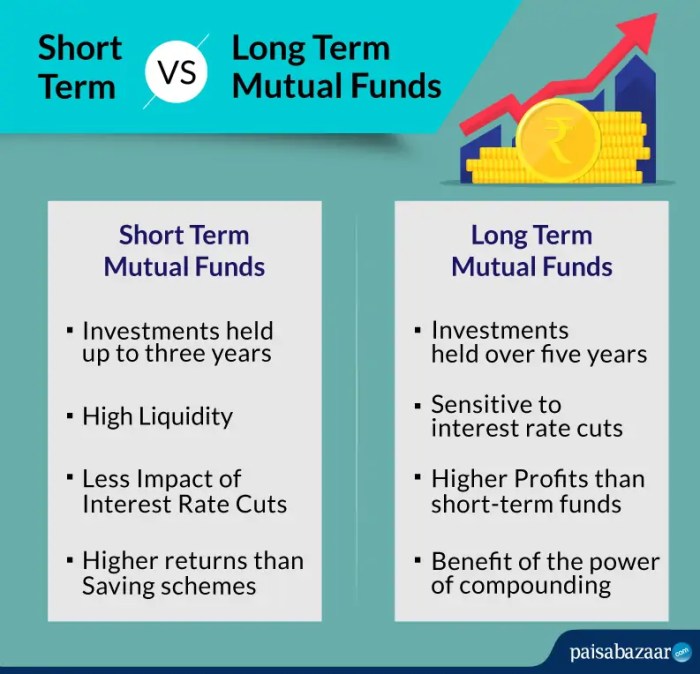
Short-Term vs Long-Term Investment Horizon sets the stage for this enthralling narrative, offering readers a glimpse into a story that is rich in detail with a casual formal language style and brimming with originality from the outset.
Investing your money wisely is crucial for financial success, and understanding the differences between short-term and long-term investment horizons is key to making informed decisions.
Short-Term vs Long-Term Investment Horizon
When it comes to investing, one of the key decisions investors need to make is whether to focus on short-term or long-term investment horizons. Each approach has its own set of characteristics and benefits, which can significantly impact an investor’s portfolio.
Short-Term Investments
Short-term investments are typically held for a period of one year or less. These investments are often considered to be more liquid, meaning they can be easily converted to cash. Examples of short-term investments include savings accounts, money market accounts, and certificates of deposit.
- Short-term investments are generally less risky compared to long-term investments.
- They offer quick returns and the ability to take advantage of short-term market fluctuations.
- Investors can easily access their funds in case of emergencies or unforeseen expenses.
Long-Term Investment Strategies
Long-term investment strategies involve holding assets for an extended period, typically five years or more. This approach focuses on achieving long-term financial goals, such as retirement planning or wealth accumulation. Common long-term investments include stocks, bonds, and real estate.
- Long-term investments have the potential for higher returns compared to short-term investments.
- They allow investors to benefit from compounding interest over time.
- Long-term investments are more resilient to short-term market volatility and economic downturns.
Comparison of Short-Term vs Long-Term Investment Horizons
While both short-term and long-term investment horizons have their advantages, it’s important for investors to consider their financial goals, risk tolerance, and time horizon when choosing between the two.
- Short-term investments provide liquidity and lower risk, making them suitable for short-term financial goals or emergencies.
- Long-term investments offer the potential for higher returns and allow investors to build wealth over time.
- Diversifying between short-term and long-term investments can help balance risk and return in a well-rounded investment portfolio.
Investment Advice
When it comes to managing your investments, seeking professional advice is crucial for making informed decisions that align with your financial goals and risk tolerance.
The Role of an Investment Advisor
An investment advisor plays a vital role in guiding investors through the complex world of financial markets. They offer personalized advice based on your individual financial situation, goals, and risk tolerance. By leveraging their expertise, you can make well-informed investment decisions that are tailored to your specific needs.
Key Factors to Consider When Choosing an Investment Advisor
- Qualifications: Ensure that the investment advisor holds relevant certifications and licenses, such as Certified Financial Planner (CFP) or Chartered Financial Analyst (CFA).
- Experience: Look for an advisor with a proven track record of successfully managing investments and helping clients achieve their financial goals.
- Communication: Choose an advisor who communicates effectively and is transparent about their investment strategy and fees.
- Fee Structure: Understand how the advisor is compensated, whether through fees, commissions, or a combination of both, to ensure that their interests align with yours.
- Compatibility: Select an advisor whose investment philosophy and approach resonate with your own values and financial objectives.
Investment Banking

Investment banking plays a crucial role in financial markets by connecting businesses in need of capital with investors looking to invest their funds. These banks provide a range of services that help companies raise capital and navigate complex financial transactions.
Capital Raising for Businesses
Investment banks facilitate the process of raising capital for businesses through various means, such as initial public offerings (IPOs), debt offerings, and private placements. By underwriting these offerings, investment banks help companies access the capital they need to grow and expand their operations.
- Initial Public Offerings (IPOs): Investment banks assist companies in going public by pricing and selling shares to investors. This process helps companies raise significant capital to fund their growth initiatives.
- Debt Offerings: Investment banks help businesses issue bonds or other debt securities to raise funds. They advise on the structure of the debt offering and connect the company with potential investors.
- Private Placements: Investment banks facilitate private placements, where companies can raise capital from a select group of investors without going through the public markets. This allows businesses to access funding quickly and efficiently.
Services Offered by Investment Banks
Investment banks offer a wide range of services to clients, including mergers and acquisitions (M&A) advisory, restructuring, underwriting, and financial advisory services. These services help companies navigate complex financial transactions and strategic decisions.
- Mergers and Acquisitions (M&A) Advisory: Investment banks provide advice to companies looking to merge with or acquire other businesses. They assist in valuing the target company, negotiating the deal, and securing financing.
- Restructuring: Investment banks help companies in financial distress reorganize their operations, debt, or ownership structure to improve their financial health. This may involve debt refinancing, asset sales, or other strategic changes.
- Underwriting: Investment banks underwrite securities offerings, such as IPOs and debt issuances, by purchasing the securities from the issuer and reselling them to investors. This helps companies raise capital while managing risk.
- Financial Advisory: Investment banks provide strategic financial advice to clients on a range of issues, including capital structure optimization, risk management, and investment strategy. They help clients make informed decisions to achieve their financial goals.
Investment Opportunities
When considering investment opportunities, investors have a wide range of options to choose from. It is essential to evaluate these opportunities carefully to make informed decisions that align with your financial goals.
Types of Investment Opportunities
- Stock Market: Investing in individual stocks or exchange-traded funds (ETFs) offers potential for capital appreciation.
- Real Estate: Purchasing properties for rental income or capital gains can be a lucrative long-term investment.
- Bonds: Investing in government or corporate bonds provides fixed income payments over a specified period.
- Mutual Funds: Diversified investment vehicles managed by professionals can offer exposure to various asset classes.
- Commodities: Investing in precious metals, oil, or agricultural products can serve as a hedge against inflation.
Factors to Consider When Evaluating Investment Opportunities
- Risk Tolerance: Assess your comfort level with potential losses and fluctuations in investment value.
- Time Horizon: Determine whether you have a short-term or long-term investment outlook.
- Financial Goals: Align investment choices with your objectives, such as retirement planning or wealth accumulation.
- Market Conditions: Consider economic indicators, interest rates, and geopolitical factors that may impact investments.
- Diversification: Spread investments across different asset classes to reduce risk exposure.
Spotting Lucrative Investment Opportunities
- Research: Conduct thorough research on industries, companies, or markets that show growth potential.
- Financial Analysis: Analyze financial statements, earnings reports, and market trends to identify undervalued assets.
- Seek Expert Advice: Consult with financial advisors or investment professionals for guidance on spotting lucrative opportunities.
- Stay Informed: Keep up-to-date with market news, economic developments, and technological advancements that may create investment prospects.
Investment Strategy

Having a well-defined investment strategy is crucial for achieving financial goals and managing risk effectively.
The Importance of a Well-Defined Investment Strategy
An investment strategy Artikels a set of rules, behaviors, and procedures that guide an investor’s selection of an investment portfolio. It helps investors make informed decisions, stay focused on their objectives, and navigate the complexities of the financial markets.
Popular Investment Strategies
- Value Investing: Involves finding undervalued stocks that are trading below their intrinsic value. Investors following this strategy aim to buy low and sell high.
- Growth Investing: Focuses on investing in companies that are expected to grow at an above-average rate compared to the market. Investors seek capital appreciation by investing in these high-growth companies.
- Income Investing: Emphasizes generating a steady income stream through investments like dividend-paying stocks, bonds, or real estate investment trusts (REITs).
Risk Tolerance and Investment Strategy
Risk tolerance plays a significant role in determining the most suitable investment strategy for an individual. Investors with a higher risk tolerance may opt for aggressive strategies like growth investing to pursue higher returns, while those with a lower risk tolerance may prefer conservative strategies like value investing to prioritize capital preservation.
In conclusion, the choice between short-term and long-term investment strategies depends on various factors such as financial goals, risk tolerance, and time horizon. By weighing the benefits and drawbacks of each approach, investors can tailor their investment plans to align with their objectives and achieve long-term success in the financial markets.
Essential FAQs
How do short-term investments differ from long-term investments?
Short-term investments are typically held for a shorter duration, usually less than a year, aiming for quick returns. Long-term investments, on the other hand, are held for an extended period, often years, focusing on gradual growth and compounding returns.
What are the benefits of choosing a long-term investment horizon?
Long-term investments provide the opportunity for higher returns due to compounding interest, lower tax rates on capital gains, and the ability to ride out market volatility for a more stable portfolio.
How does risk tolerance influence the choice between short-term and long-term investment strategies?
Investors with a higher risk tolerance might opt for short-term investments to capitalize on market fluctuations, while those with a lower risk tolerance may choose long-term investments for a more conservative approach.





